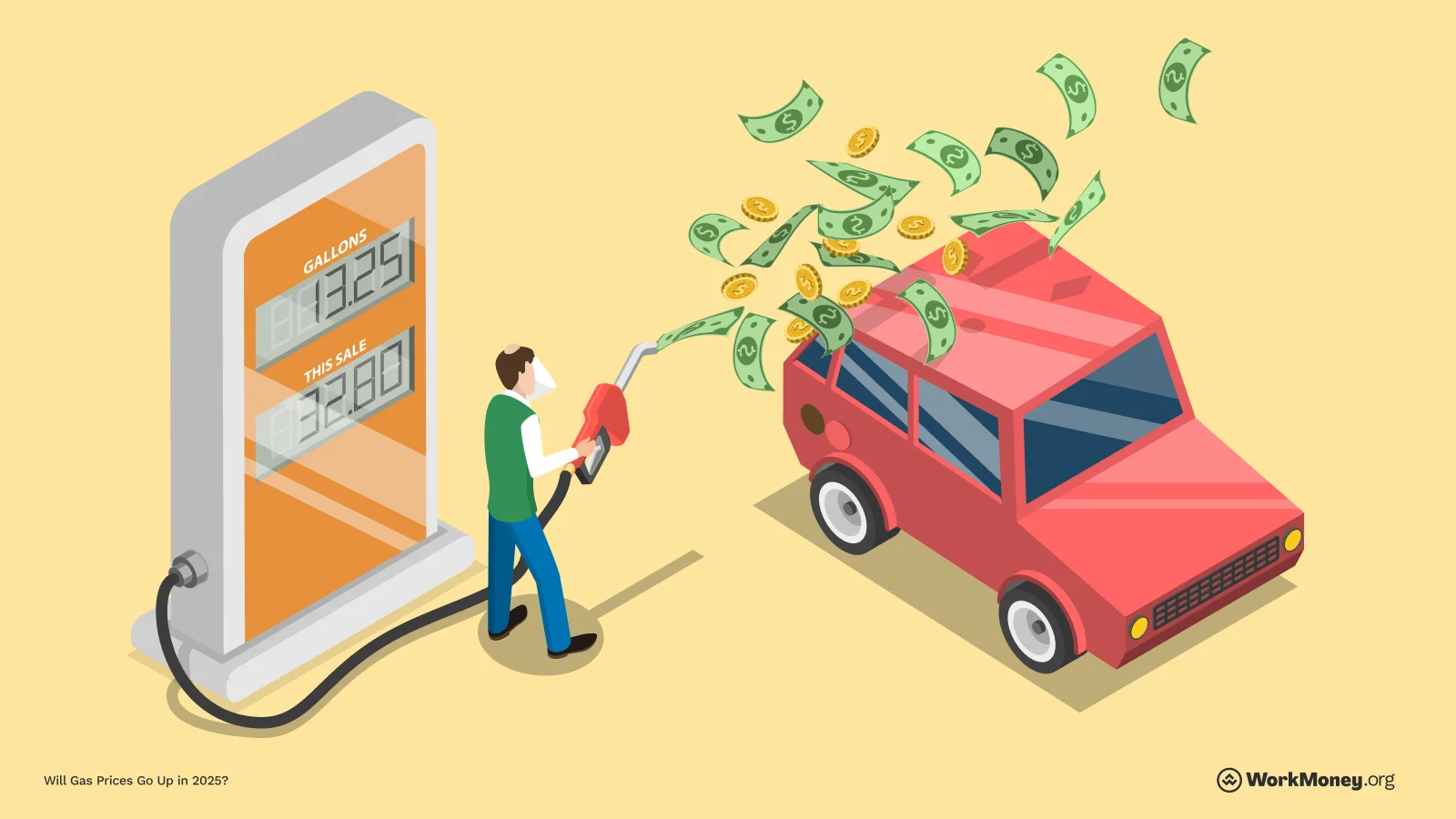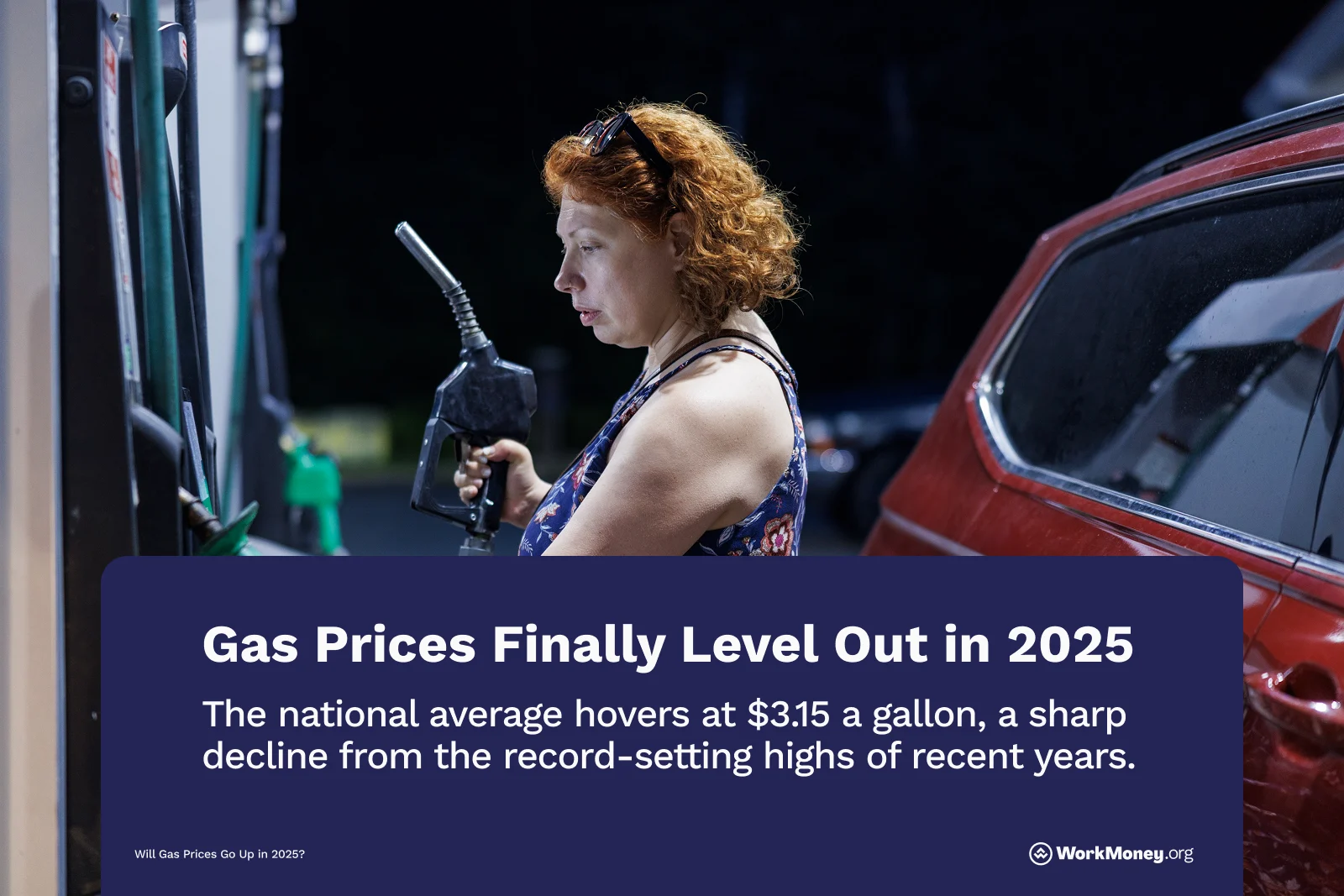Will Gas Prices Go Up in 2025?
Gas prices have normalized this year, but could swing between now and end of the year.

Gas prices remain under control so far in 2025. This is a relief for many after national gas prices soared in 2022 and 2023, among other everyday expenses. This was caused by roaring inflation as well as the war between Ukraine and Russia. This led to consumers spending roughly $200 per month on fuel, according to the Bureau of Labor Statistics.
Now, prices have normalized and even fallen below the rate of inflation. In May 2025, the national average price for gasoline sat at $3.15 per gallon. If you drive a typical car, your gas tank will likely hold 15 gallons, meaning your fill-up will cost you just shy of $50. This is nearly equal to what prices were in 2013, which is a positive mark that your dollars are holding their value.
But what do gas prices look like for the future? The WorkMoney team looked into the data to see what prices could potentially look like as more gas stations shutter and EV adoption rises.

What Are Gas Prices Like Now?
Gas prices have largely normalized around the U.S. in 2025. However, there will always be a large gap in what people pay, based on what car they drive and their location.
The best way to check up-to-date gas prices across the U.S. is the AAA Club fuel prices chart. At the time of writing, the national average for unleaded gas hovered around $3.15.
However, the scale varies widely, with Louisiana around $2.78 and California near $4.50 per gallon.
Will Gas Prices Go Up in 2025?
The short answer: no one knows. Gas prices can be volatile as supply and demand shocks can change prices seemingly in the blink of an eye. Here are a few things that could cause gas prices to rise in the second half of 2025.
Supply Problems
Gas prices can go up and down unexpectedly when something interferes with producing or delivering oil. This can include natural disasters like hurricanes, earthquakes, or even geopolitical issues like wars.
More People Driving
If more people hit the road, that means more gas is being used. When demand goes up and supply stays the same, prices tend to rise.
Here’s the interesting part: U.S. drivers continue to set new records collectively for total miles driven, but the average driver is driving less. This could be attributed to more people working from home.
New Government Rules
Sometimes the government adds new taxes or passes environmental laws that affect how gas is made or sold. While these rules can help the planet, they may also make gas more expensive.
For example, California just increased its gas tax on July 1 by roughly 1 cent per gallon.
World Events and Politics
Gas is a global business, and many oil-producing countries work together to control how much oil they sell. If these countries decide to produce less oil, it can drive prices higher everywhere.
How To Reduce Your Gas Bill
If your fuel bill is too high, there are several things to consider to reduce your overall costs:
Be mindful of where you buy gas: There are roughly 196,000 gas stations in the U.S. This means that unless you’re in a rural area, there are likely multiple gas stations competing for your business. Use the GasBuddy app to find the cheapest gas in your area.
Consider warehouses for discounts: If you have a Sam’s Club, Costco, or other warehouse club in your area, it may be worth signing up for the gas savings alone.
You can also use the Upside app to search for gas discounts and other easy ways to save money in your area.
Consider upgrading your car: There are multiple options to consider to improve your gas efficiency. First, ensure that the tires on your car are properly inflated and still have enough tread on them. Bad tires could be making your car less efficient. If your car is simply older and isn’t fuel efficient, the money you’re throwing away on gas might be better served in a newer vehicle with better gas mileage.
Final Thoughts
Gas is a necessary line item in your budget, but it doesn’t have to eat away at your income. Like any expense, try to preplan ahead of time before having to make an emergency stop at the first gas station you see.
About the Author

Brett Holzhauer
Brett Holzhauer is a Certified Personal Finance Counselor (CPFC) who has reported for outlets like CNBC Select, Forbes Advisor, LendingTree, UpgradedPoints, MoneyGeek and more throughout his career. He is an alum of the Walter Cronkite School of Journalism at Arizona State. When he is not reporting, Brett is likely watching college football or traveling.

